Template Metaprogramming – Hybrid Programming
First of all, hybrid programming is not an official term. I created it to emphasize an exciting aspect of templates. The difference between function arguments and template arguments.
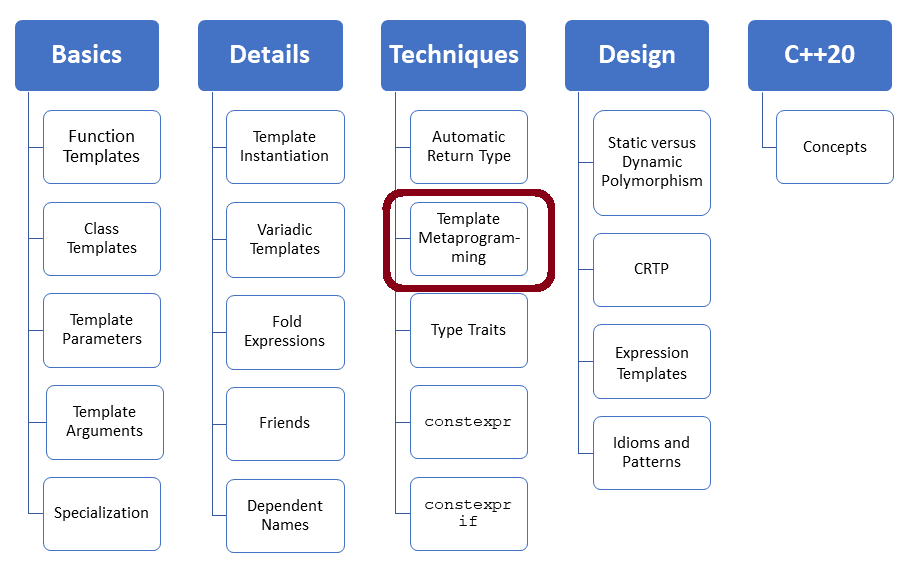
I ended my last post, “Template Metaprogramming – How it Works” with a riddle. Here is the context for the riddle.
The Riddle
The function power and Power calculate the pow(2, 10). power is executed at run time and Power at compile time.
// power.cpp #include <iostream> int power(int m, int n) { int r = 1; for(int k = 1; k <= n; ++k) r *= m; return r; } template<int m, int n> struct Power { static int const value = m * Power<m, n-1>::value; }; template<int m> struct Power<m, 0> { static int const value = 1; }; int main() { std::cout << '\n'; std::cout << "power(2, 10)= " << power(2, 10) << '\n'; std::cout << "Power<2,10>::value= " << Power<2, 10>::value << '\n'; std::cout << '\n'; }
If you want more details about both functions, read my previous post, “Template Metaprogramming – How it Works“.
So far, so good, but what is happening in the following example?
// powerHybrid.cpp #include <iostream> template<int n> int Power(int m){ return m * Power<n-1>(m); } template<> int Power<0>(int m){ return 1; } int main() { std::cout << '\n'; std::cout << "Power<0>(10): " << Power<0>(20) << '\n'; std::cout << "Power<1>(10): " << Power<1>(10) << '\n'; std::cout << "Power<2>(10): " << Power<2>(10) << '\n'; std::cout << '\n'; }
As expected, Power does its job.
 Modernes C++ Mentoring
Modernes C++ Mentoring
Do you want to stay informed: Subscribe.
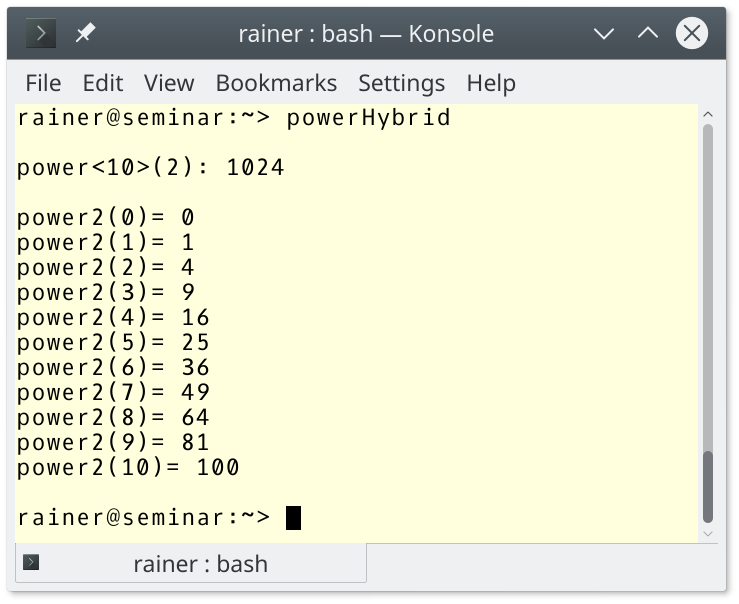
Here is the riddle in short one more: Is Power a function or a metafunction?
Hybrid Programming
To make it short.
The calls Power<0>(10), Power<1>(10), and Power<2>(10) use sharp and round brackets and calculate 10 to the power of 0, 1, and 2. This means 0, 1, and 2 are compile-time arguments, and 10 is a run-time argument. To say it differently: Power is, at the same time, a function and a metafunction. Let me elaborate more on this point.
Power at Run Time
First, I can instantiate Power for 2, give it the name Power2 and use it in a for-loop.
// powerHybridRuntime.cpp #include <iostream> template<int n> int Power(int m){ return m * Power<n-1>(m); } template<> int Power<0>(int m){ return 1; } int main() { std::cout << '\n'; auto Power2of = Power<2>; for (int i = 0; i <= 20; ++i) { std::cout << "Power2of(" << i << ")= " << Power2of(i) << '\n'; } std::cout << '\n'; }
Power2of enables it to calculate the squares of 0 … 20 at run time.
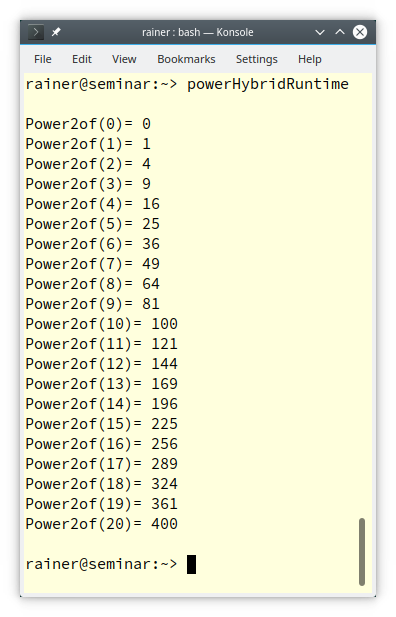
You cannot invoke Power with different template arguments in the for-loop. Template instantiation requires a constant expression. To make it short: The following use of Power fails with a compile-time error that “the value of 'i' is not usable in a constant expression“.
for (int i = 0; i <= 20; ++i) {
std::cout << “Power<“ << i << “>(2)= “ << Power<i>(2) << ‘\n’;
}
Honestly, there is a more interesting difference between a function and a metafunction.
Power at Compile Time
When you study the previous program powerHybrid.cpp in C++ Insights, you see that each usage of Power with a different template argument creates a new type.
This means that the invocation Power<2>(10) causes the recursive template instantiation for Power<1>(10), and Power<0>(10). Here is the output of C++ Insights.
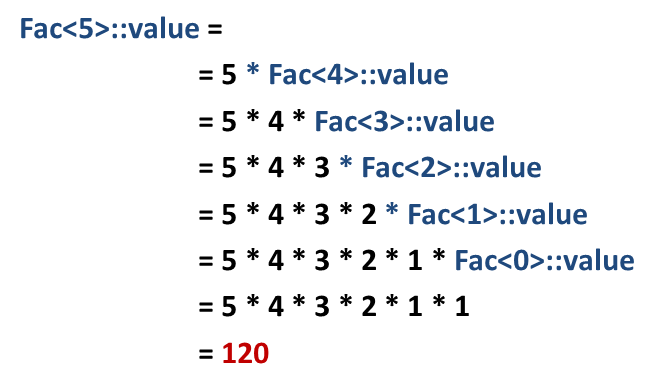
To sum up my observation. Each template instantiation creates a new type.
Creating New Types
When you use a template such as Power, std::vector, or std::array, you can invoke it with two kinds of arguments: function arguments and template arguments. The function arguments go into the round brackets (( ... )) and the template arguments go into the sharp brackets (<...>). The template arguments create new types. Or, to put it the other way around. You can parameterize templates in two ways: at compile time with sharp brackets (<...>). and at run time with round brackets (( ... ).
auto res1 = Power<2>(10); // (1) auto res2 = Power<2>(11); // (2) auto rest3 = Power<3>(10); // (3) std::vector<int> myVec1(10); // (1) std::vector<int> myVec2(10, 5); // (2) std::vector<double> myDouble(5); // (3) std::array<int, 3> myArray1{ 1, 2, 3}; // (1) std::array<int, 3> myArray2{ 1, 2, 3}; // (2) std::array<double, 3> myArray3{ 1.1, 2.2, 3.3}; // (3)
- (1) creates a new
Powerinstance,std::vectorof length 10, or astd::arraywith three elements - (2) reuses the already created types in the previous lines (1)
- (3) creates a new type
A few of my German readers already pointed it out. My metafunction Power has a significant flaw.
The Big Flaw
I get undefined behavior when I instantiate with a negative or too-big number.
Power<-1>(10)causes an infinite template instantiation because the boundary condition Power<0>(10) does not apply.Power<200>(10)causes anintoverflow.
The first issues can be fixed by using a static_assert inside the Power template: static_assert(n >= 0, "exponent must be >= 0");. There is no simple solution for the second issue.
// powerHybridRuntimeOverflow.cpp #include <iostream> template<int n> int Power(int m){ return m * Power<n-1>(m); } template<> int Power<0>(int m){ return 1; } int main() { std::cout << '\n'; auto Power10of = Power<10>; for (int i = 0; i <= 20; ++i) { std::cout << "Power10of(" << i << ")= " << Power10of(i) << '\n'; } std::cout << '\n'; }
The overflow starts with Power10of(9). pow(9, 10) is 3,486,784,40
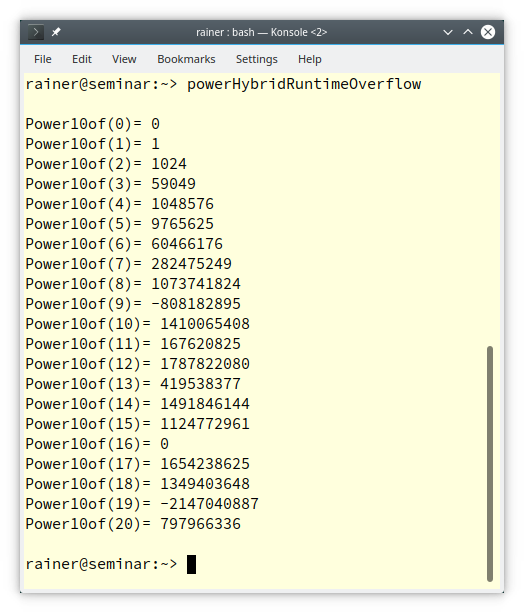
My Disclaimer
At the end of these three posts, “Template Metaprogramming – How it All Started“, “Template Metaprogramming – How it Works” about template metaprogramming, I have to make a disclaimer. I don’t want you to use templates to program at compile time. Most of the time, constexpr (C++11) or consteval (C++20 is the better choice.
I explained template metaprogramming for two reasons.
- Template metaprogramming helps you better understand templates and the process of template instantiation.
- The type-traits library applies the idea and uses the conventions of template metaprogramming.
What’s next?
In my next post, I will write about the type-traits library. The type-traits library (C++11) is template metaprogramming in a beautiful guise.
Thanks a lot to my Patreon Supporters: Matt Braun, Roman Postanciuc, Tobias Zindl, G Prvulovic, Reinhold Dröge, Abernitzke, Frank Grimm, Sakib, Broeserl, António Pina, Sergey Agafyin, Андрей Бурмистров, Jake, GS, Lawton Shoemake, Jozo Leko, John Breland, Venkat Nandam, Jose Francisco, Douglas Tinkham, Kuchlong Kuchlong, Robert Blanch, Truels Wissneth, Mario Luoni, Friedrich Huber, lennonli, Pramod Tikare Muralidhara, Peter Ware, Daniel Hufschläger, Alessandro Pezzato, Bob Perry, Satish Vangipuram, Andi Ireland, Richard Ohnemus, Michael Dunsky, Leo Goodstadt, John Wiederhirn, Yacob Cohen-Arazi, Florian Tischler, Robin Furness, Michael Young, Holger Detering, Bernd Mühlhaus, Stephen Kelley, Kyle Dean, Tusar Palauri, Juan Dent, George Liao, Daniel Ceperley, Jon T Hess, Stephen Totten, Wolfgang Fütterer, Matthias Grün, Phillip Diekmann, Ben Atakora, Ann Shatoff, Rob North, Bhavith C Achar, Marco Parri Empoli, Philipp Lenk, Charles-Jianye Chen, Keith Jeffery, Matt Godbolt, Honey Sukesan, bruce_lee_wayne, Silviu Ardelean, and Seeker.
Thanks, in particular, to Jon Hess, Lakshman, Christian Wittenhorst, Sherhy Pyton, Dendi Suhubdy, Sudhakar Belagurusamy, Richard Sargeant, Rusty Fleming, John Nebel, Mipko, Alicja Kaminska, Slavko Radman, and David Poole.
| My special thanks to Embarcadero |  |
| My special thanks to PVS-Studio |  |
| My special thanks to Tipi.build |  |
| My special thanks to Take Up Code |  |
| My special thanks to SHAVEDYAKS |  |
Modernes C++ GmbH
Modernes C++ Mentoring (English)
Rainer Grimm
Yalovastraße 20
72108 Rottenburg
Mail: schulung@ModernesCpp.de
Mentoring: www.ModernesCpp.org




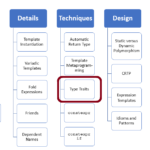
Leave a Reply
Want to join the discussion?Feel free to contribute!